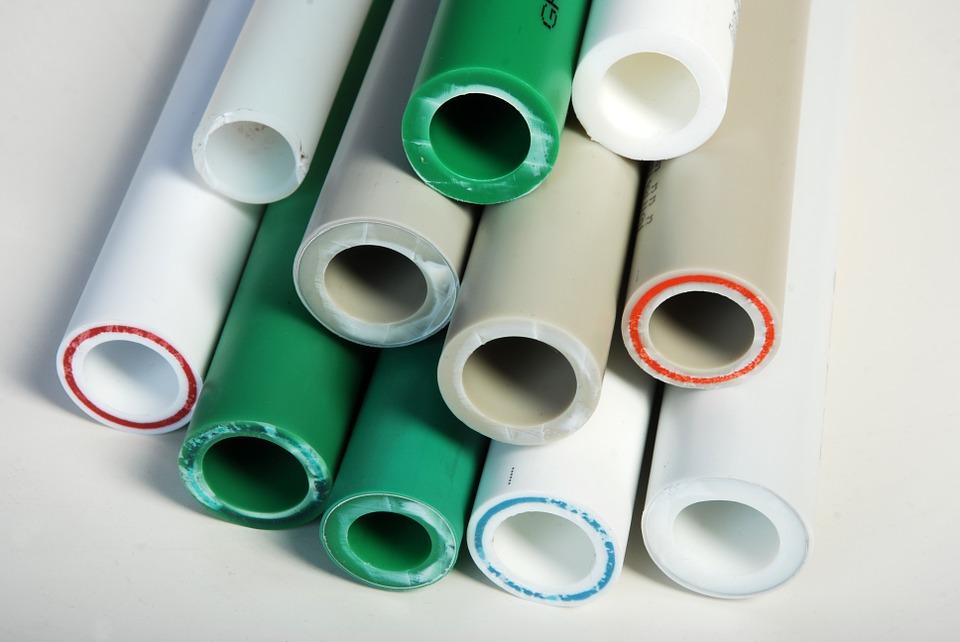
There are significant differences in the properties and materials that are used in PVC, UPVC, CPVC, HDPE and GI pipes. While PVC, UPVC, CPVC, and HDPE are non-metallic pipes, GI pipes are metallic pipes. All of these have different chemical compositions and are used in plumbing operations and other applications that are not too critical.
• They are economically preferable over GI pipes.
• Plastic pipes are resistant to corrosion.
• Since they are not prone to corrosion, they also do not require painting.
• Plastic is known to be a bad conductor of heat and thus does not require any heat conservation insulation.
• Quick fabrication is possible in plastic pipes which is not possible in metallic pipes. While metallic pipes require proper welding, plastic pipes can be fabricated in a few minutes using an appropriate adhesive.
Just on the other hand, one needs to be cautious as well when using nonmetallic pipes. These come with their set of dangers such as fire hazard. Due to a low melting point, so it allows a shallow level of pressure, and has a lower strength as well. These make non-metallic pipes unsuitable for a few purposes.
We discuss some of the basic characteristic features of all of these here.
PVC and CPVC are non-metallic pipes, made from thermoplastic materials. This clearly means that they are resistant to any chemical attack and have similar other advantages over metallic pipes. But they do come with their share of limitations.
These are regarded as plastic pipe works, and both fittings and pipes are available in these materials
1. PVC stands for Polyvinyl Chloride, and CPVC stands for Chlorinated Polyvinyl Chloride.
2. PVC and CPVC are quite robust.
3. Both of these are popularly used in plumbing processes and processes that are less critical.
4. After Polyethylene and Polypropylene, PVC remains the third most commonly produced synthetic plastic polymer.
5. CPVC is produced by chlorination of Polyvinyl Chloride resin.
6. They are exceptionally resistant to any chemical attack.
7. When at elevated temperatures, CPVC has a higher strength than the PVC. CPVC is also very flexible.
8. Both PVC and CPVC are affected by ultraviolet exposure and must be provided special protection against it if they are installed outdoors.
9. PVC and CPVC tend to soften when they are exposed to extremely high temperatures.
10. The PVC and CPVC pipes are made using the extrusion process while the valves, fittings, and flanges are made using the injection moulding method.
11. PVC is popularly used in water piping at homes and has several other industrial applications as well.
HDPE or High-Density Polyethylene, also known as polyethylene high density (PEHD) is a thermoplastic that is made from petroleum. When used for pipes, it is also sometimes called ‘alkathene’ or ‘polythene’. It has several advantages such as low cost, quick fabrication, corrosion resistant etc.
1. High-density polyethylene is highly resistant to chemicals.
2. It has several advantages over LDPE and PVC.
3. It has better tensile strength and higher softening point.
4. The pipes made from HDPE are manufactured using the extrusion process.
5. Some of the favourite uses of HDPE included low-pressure natural gas services, water distribution and used a lining material in carbon steel pipe.
UPVC that stands for unplasticized polyvinyl chloride is based on PVC that is regarded as the most versatile polymer available today. While PVC is used in different facets of life, it is also uniquely formulated to prepare a unique combination called UPVC. UPVC is popularly used as a window framing material across the globe. The material has several advantages that are unmatched and not available in any other material.
1. UPVC is highly chemical resistant and is used popularly for both residential as well as commercial purposes.
2. It is not just resistant to UV rays but also resistant to rain and water.
3. UPVC is recyclable and energy efficient and thus regarded as an environment-friendly option.
4. The galvanized steel used in the production of UPVC makes it a highly durable material.
5. UPVC doors and windows are weatherproof and provide a high level of insulation.
6. Using UPVC doors and windows provides an additional level of safety and security.
7. UPVC is self-extinguishing in nature. This too makes it a popular choice for the safety of the buildings.
8. The doors and windows made with UPVC are sound-proof. They cut out all the unnecessary noise and sound thus keeping the stress levels to all-time low.
9. The UPVC doors and windows are easy to install as well as uninstall.
GI pipes or Galvanized Iron pipes are manufactured using mild steel strips. These are made of low carbon steel coils and are very widely used for the distribution of raw water or treated water in both rural as well as urban areas.
These pipes have a coating of Zinc that is done using the process of galvanization. The two popular methods of galvanization include hot-dip galvanization and Electro galvanization. Some of its features that are responsible for its popularity include its low cost, light-weight, and ease of handling it. GI pipes are used in manufacturing water and sewage pipes, constructing electric poles, in oil and gas transmissions and for structural, engineering and automotive purposes.
1. GI pipes and products are highly durable and promise a long life.
2. They have the Anti-Rust Coating that gives a superior finish.
3. They are highly resistant to corrosion.
4. They have a superior bending ability that makes it easy to cut and thread.
5. They are agreeable to rigorous fabrication.
Understood the difference or have queries about these pipes?
Copyright © 2024 JAMEX. All rights reserved.